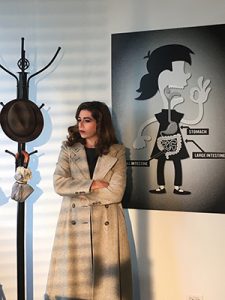 Sophie Shrand plays Detective Di Gestion to explore what happens when you swallow gum.“Kids are innately curious—they’re constantly questioning and absorbing information. We should nurture that curiosity,” Shrand says. The goal is to demonstrate “that science is an everyday experience—you can experience it on the street, or in your own kitchen.”
Sophie Shrand plays Detective Di Gestion to explore what happens when you swallow gum.“Kids are innately curious—they’re constantly questioning and absorbing information. We should nurture that curiosity,” Shrand says. The goal is to demonstrate “that science is an everyday experience—you can experience it on the street, or in your own kitchen.”
Science with Sophie’s target audience is young people ages 7 to 14, but the show’s humor, characters, and science are intended to entertain adults as well, Shrand says.
“I want girls to know they are smart, brave, funny, and they have everything they need to be a scientist. But that message isn’t literal; it’s more about modeling behavior and showing that science is fun and interesting,” she says. “Having strong female role models is important for boys as well as girls, and everyone benefits when women are respected and given a platform.”
Shrand has always had an interest in both science and performance: her dad is a doctor, and she began acting on stages in Boston at age 6. At Northeastern, Shrand’s first few co-ops were in research labs, but she felt lonely and uninspired in that setting. Her solution was to create a co-op at the Museum of Science, where she helped develop science-themed performances for kids and adults. “I just really loved communicating science,” she says. To boost her performance skills and ability to think on her feet, she studied improv at the Improv Asylum in Boston’s North End.
When she moved to Chicago in 2013, Shrand studied at the famed Second City theater, landed a role in Second City’s Musical House Ensemble, and got a day job developing educational programs at the Museum of Science and Industry. On her own time, she produced a few short segments for Science with Sophie, then used those segments to crowdsource $45,000 and develop five full episodes of five to seven minutes each.
To create the full episodes, Shrand hired a production team and enlisted writing help from female colleagues in science and performance from around the country. Shrand didn’t have a big budget, so the team was scrappy—even filming some scenes in her small Chicago apartment.
 Sophie on stage in Working in the Studio Theatre in 2009.Shrand will soon start raising money for a second season, and hopes to bring Science with Sophie to a bigger audience—perhaps on a cable network or by creating an independent business.
Sophie on stage in Working in the Studio Theatre in 2009.Shrand will soon start raising money for a second season, and hopes to bring Science with Sophie to a bigger audience—perhaps on a cable network or by creating an independent business.
“My goal is to reach as many kids as possible, with a self-sustaining show that promotes women in STEM and inspires the next generation of scientists,” she says.
This story, by Sarah Coppola, appeared in News @ Northeastern on January 29. 2018


